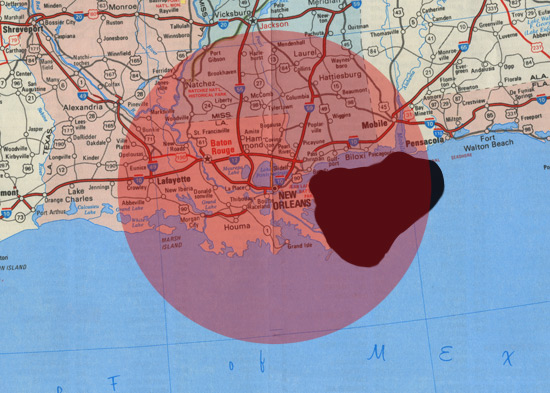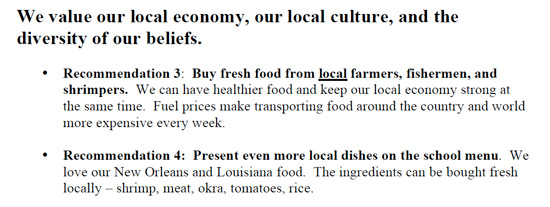
When BP's Deep Water Horizon well exploded in the Gulf of Mexico on April 20, it was difficult to imagine the scope of its impact on the delicate coastlines of Louisiana and adjacent states.
Today, the former platform site continues to spill about 5,000 barrels a day – or 210,000 gallons – into the Gulf, with no containment strategy yet in sight.
"It is hard to internalize this reality and many of us are numb at the moment," says Jane Wholey, a founder of Kids Rethink New Orleans Schools, a group of students and supportive adults that formed to reimagine educational opportunities in the aftermath of Hurricane Katrina. As Wholey and a team of young Rethinkers were returning this past weekend from Washington, D.C. – where they picked up a commendation in a national school design contest – the spill grew ominously larger and lurched closer to their local coastline.
Last night as I watched the news, switching channels from cable to network, from Rachel Maddow to Fox News, from the Weather Channel to local affiliate coverage, I was struck again and again by the emphasis placed on the fate of the Gulf ecosystem and its attendant fishing businesses – many of them tiny family-run operations – that together form a $2.4 billion dollar fishing industry.
So it wasn't a surprise when Wholey mentioned shrimping first among the impacts felt by the student Rethinkers. The Gulf is the top producer of seafood, including shrimp, in the U.S. And Louisiana shrimp is a major cultural and economic support for families in region. Think gumbo, think jambalaya, think remoulade, think Creole. Or think about that delicate shrimp cocktail in a New York restaurant – it probably came from the Gulf.
In fact, in 2008, when the Rethinkers published their influential Twelve Recommendations for Public School Cafeterias, among their recommendations was this language on shrimp, a local food source that is likely to be devastated by the spill:

"We are trying to figure out now how we can be supportive of the shrimpers," says Wholey. "We're heartbroken because the public school food market we've been trying to open to them will probably not be possible right now.We are committed to the survival of the shrimpers...and the shrimp!"
In addition to the fishing industry, tourism and the oil industry are major employers throughout the region. All three industry sectors are slowed or suspended during this crisis, affecting the incomes of families and their children throughout the entire Gulf region.
"We have families with no money coming in," says Wholey.
And the impact lost revenue may have on the region's tax base that supports schools is as yet unknown, in an area that is still rebuilding from the impact of Katrina.
The red circle on the map at the top of this page illustrates a 150-mile radius centered on the city of New Orleans. A 150-mile radius is often used as a way of introducing students to the area around their home that would provide locally sourced food, which for the Rethinkers includes shrimp. The black area on the map is the approximate size and location of the spill at this writing. An animation of the formation and growth of the spill is at nola.com.
Dr. Carolie Sly, Education Program Director for the Center for Ecoliteracy comments, "When students know what foods originate within a 150-mile radius of their home, they have a deeper understanding of the consequences of a disaster like the oil spill off the coast of New Orleans. Seafood from that region, particularly shrimp, is a significant part of the local diet and represents a large part of the economy. The oil spill will disrupt the local seafood industry and will severely curtail the availability of shrimp and other seafood, not only for those within a 150-mile radius of New Orleans, but for people across the nation."
You can leave a message of support for New Orleans students below. We'll make sure they get it.
Gulf spill won’t dampen U.S. appetite for oilOil spills — there’s no free lunch
No comments:
Post a Comment